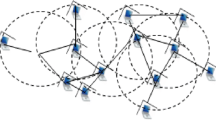Abstract
A detailed description of the Internet Protocol Address Assignment (IPAA) is presented and state diagrams for its behavior constructed. Formulae for the expected latency and communication overhead of the IPAA protocol are derived, with the results being given as functions of the number of nodes in the network with message loss rate, contention window size, coverage ratio, and the counter threshold as parameters. The IPAA and MANET Configuration (MANETconf) are compared in detail. The results show that the latency and communication overhead for MANETconf are significantly higher than for the IPAA protocol. Results of extensive sensitivity analyses for the IPAA protocol are also presented.
Access this chapter
Tax calculation will be finalised at checkout
Purchases are for personal use only
Preview
Unable to display preview. Download preview PDF.
Similar content being viewed by others
References
Baccelli, E.: Address autoconfiguration for MANET: Terminology and problem statement, IETF draft-ietf-autoconf-statement-02 (September 2007)
Knowlton, K.C.: A fast storage allocator. Commun. ACM 8(10), 623–624 (1965)
Bernardos, C., Calderon, M., Moustafa, H.: Survey of IP address autoconfiguration mechanisms for MANETS, IETF draft-bernardos-manet-autoconf-survey-03 (April 2008)
Perkins, C.: IP address autoconfiguration for ad hoc networks, IETF draft-perkins-manet-autoconf-01 (November 2001)
Jeong, J.: Ad hoc IP address autoconfiguration, IETF draft-jeong-adhoc-ip-addr-autoconf-06 (January 2006)
Vaidya, N.: Weak duplicate address detection in mobile ad hoc networks. In: Proc. of ACM MOBIHOC, Lausanne (2002)
Weniger, K.: Passive duplicate address detection in mobile ad hoc networks. In: Proc. of IEEE WCNC (March 2003)
Mase, K., Adjih, C.: No overhead autoconfiguration OLSR, IETF draft-mase-manet-autoconf-noaolsr-01 (April 2006)
Weniger, K.: PACMAN: Passive autoconfiguration for mobile ad hoc networks. IEEE Journal on Selected Areas in Communications 23(3), 507–519 (2005)
Zhou, H., Ni, L., Mutka, M.: Prophet address allocation for large scale MANETs. In: Proceedings of INFOCOM (2003)
Yong, L., Ping, Z., JiaXiong, L.: Dynamic address allocation protocols for mobile ad hoc networks based on genetic algorithm. In: Proc. of 5th International Conference on Wireless Communications, Networking and Mobile Computing (2009)
Chu, X., Sun, Y., Xu, K., Sakander, Z., Liu, J.: Quadratic residue based address allocation for mobile ad hoc networks. In: Proc. IEEE ICC (2008)
Nesargi, S., Parakash, R.: MANETconf: Configuration of hosts in a mobile ad hoc network. In: Proc. IEEE INFOCOM. IEEE Press, New York (2002)
Mohsin, M., Parakash, R.: IP address assignment in a mobile ad hoc network. In: Proc. IEEE MILCOM, IEEE Press, New York (2002)
Tayal, A.P., Patnaik, L.M.: An address assignment for the automatic configuration of mobile ad hoc networks. Personal Ubiquitous Comput. 8(1), 47–54 (2004)
Xu, T., Wu, J.: Quorum based ip address autoconfiguration in mobile ad hoc networks. In: ICDCSW 2007: Proceedings of the 27th International Conference on Distributed Computing Systems Workshops, p. 1. IEEE Computer Society, Washington (2007)
Radaideh, A.M.: Analytical modeling of address allocation protocols in wireless ad hoc networks, Master’s thesis, The University of Mississippi (December 2008)
Ross, S.M.: Introduction to Probability Models, 9th edn. Academic Press, London (2008)
Author information
Authors and Affiliations
Editor information
Editors and Affiliations
Rights and permissions
Copyright information
© 2010 ICST Institute for Computer Science, Social Informatics and Telecommunications Engineering
About this paper
Cite this paper
Radaideh, A., Daigle, J.N. (2010). Analytical Modeling of Address Allocation Protocols in Wireless Ad Hoc Networks. In: Zheng, J., Simplot-Ryl, D., Leung, V.C.M. (eds) Ad Hoc Networks. ADHOCNETS 2010. Lecture Notes of the Institute for Computer Sciences, Social Informatics and Telecommunications Engineering, vol 49. Springer, Berlin, Heidelberg. https://doi.org/10.1007/978-3-642-17994-5_29
Download citation
DOI: https://doi.org/10.1007/978-3-642-17994-5_29
Publisher Name: Springer, Berlin, Heidelberg
Print ISBN: 978-3-642-17993-8
Online ISBN: 978-3-642-17994-5
eBook Packages: Computer ScienceComputer Science (R0)




